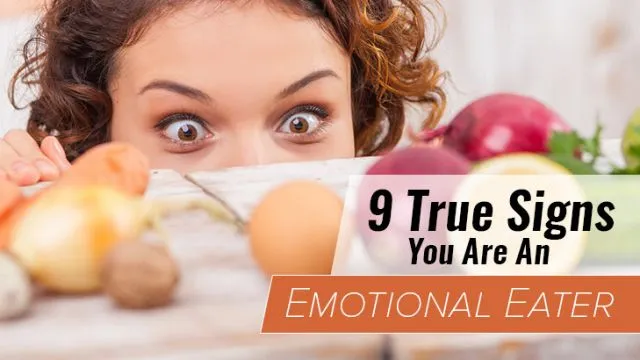
- Share on Facebook14
- Share on Pinterest
- Share on Twitter
Eating can be a very enjoyable thing, especially if you’ve just made a yummy dish and are eagerly digging in. However, savoring your food is one thing, and eating emotionally is quite another.
We all eat for sustenance, but some people eat out of instinct to soothe themselves, with food as the chosen salve. These “comfort foods” are often unhealthy, and an unchecked emotional eating habit can have the consequence of weight gain. If your comfort food of choice is processed or full of sugar, you can also be risking your health in other ways.
The following are nine signs that you may be an emotional eater.
When you’re experiencing stress or negative emotions, your mind wanders to a particular comfort food
“This has been the worst day! I need a moment to eat a chocolate chip cookie and deal with this. The world can just go away for a while and let me eat my cookie! That’s it, I’m making a batch as soon as I get home.”
You get a “rush” when you’re indulging in your favorite comfort food
When you bite into that freshly baked chocolate chip cookie, or whatever your comfort food of choice is, you experience a wave of happy emotions, almost a “high.”
It elevates your stress to not have your chosen comfort food available
“Oh my gosh, I don’t have the ingredients to make cookies, and the grocery store is closed! This night is ruined!”
It’s difficult — and stressful — for you to stop yourself from reaching for your favorite food
“I’m trying to lose weight, and I just had a huge meal, I do not need cookies tonight! But… I’ll feel better if I have one. Just one couldn’t hurt, right? I’ll be thinking about them all night if I don’t, so I better just indulge! Just this once…”
When you reach a milestone or complete a difficult task, you celebrate with food
You got a promotion, you aced an exam, or you finally got a piece of writing published — it’s obviously time for a cookie blowout!
You often lose track of how much you’re eating when indulging in your favorite foods
You have a habit of eating mindlessly when you get a plate (or bag, container, etc.) of your favorite food in front of you. You’re happily crunching away, and before you know it, the whole plate or bag is gone. This is a familiar situation. You were only going to have one, but you’ve eaten them all!
You think about eating more of your favorite food even though you’re full
“I’m so stuffed I couldn’t eat another bite. Wait, did I see cookies over there? Okay, I can make room for one, or two, of those!”
You make excuses as to why you can indulge
Whether it’s declaring a “cheat day” or telling yourself that you need to console yourself because of a setback, emotional event, or stressful day, you always find a reason to get your favorite food. If someone questions your behavior, you may get upset or defensive.
Eating makes you feel better … for a little while
Once you let yourself dive into that bag of cookies, all feels better while you’re eating them. However, as soon as you’re done, all of the negative emotions you had before you started are still there. Also, you may feel guilty for diverting from your healthy eating goals.
If you were celebrating with the cookies, you soon find that they don’t really enhance the celebration, they just lead to a sugar crash.
How to break the cycle
The first step to breaking the cycle of emotional eating is recognizing that you have a problem. It may sound cliche, but if you’re in denial, or become defensive whenever your habit is mentioned, you cannot take the steps to help yourself. Realizing what you’re doing, and making a decision to stop is key.
The next step is to be mindful of what you’re eating. No more eating in front of the TV! Savor each bite, and take time to assess when you’re full. Check out our guide to eating mindfully — this one step can truly be life-changing.
If you’re eating to combat stress, it’s important to get to the source of your stress and deal with the problem rather than medicating yourself with food. Talk to a close friend, write in a journal, and spend some time quietly reflecting. Meditation and yoga are two time-tested activities to help center yourself in the moment and get perspective on your situation.
If you’re eating to celebrate, try another method of celebration! Go rollerskating with your friends. Get concert tickets to see a favorite band. Go dancing. If you’re eating when you’re bored, you have to find another activity to fill the space. Sign up for a class, paint, do some volunteer work. The possibilities are endless.
If you do need a snack, go for a light, healthy snack, such as fresh veggies or fruits, instead of unhealthy, processed foods. These foods are way less addictive, as they don’t contain refined sugar or chemical additives, so you won’t be tempted to overindulge in them. However, make sure you’re snacking when you’re actually hungry, not when you just “feel like eating.” Be aware of what your body needs and doesn’t need.
If you find that you just can’t seem to stop your emotional eating no matter how hard you try, it may be time to find a counselor whom you can trust to help you sort out the motivations behind your habit. It may take some time and patience, but a trained professional may be able to help you significantly.
Don’t be hard on yourself, but take the necessary steps. Your health is worth it.
— Tanya Rakhmilevich
- Share on Facebook14
- Share on Pinterest
- Share on Twitter

